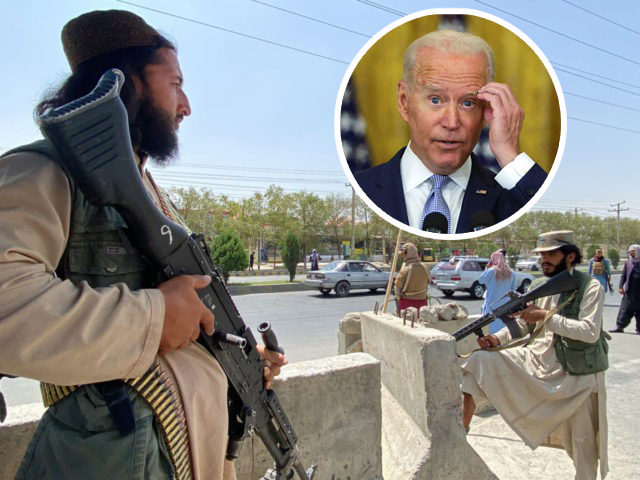The Biden administration is proceeding with talks to unfreeze the $7 billion in Afghanistan’s assets held by the U.S. Federal Reserve, Reuters reported on Monday, despite the Taliban failing to meet human rights commitments and harboring al-Qaeda mastermind Ayman al-Zawahiri in Kabul.
Reuters on Monday quoted “three sources with knowledge of the situation” who said the administration is prepared to overlook a great deal of misbehavior by the Taliban because of Afghanistan’s growing humanitarian crisis.
The United Nations and U.S. Special Investigator General for Afghanistan Reconstruction (SIGAR) both warned this month that nearly half of the Afghan population will experience “extreme levels of hunger” in the coming winter, with millions facing “near-famine conditions.”
SIGAR also warned about the Taliban’s growing “repression of women and girls,” a clear violation of promises the Islamist regime made to the United Nations after President Joe Biden’s catastrophic withdrawal one year ago brought the Taliban back to power.
The contrast between SIGAR’s warnings captures the dilemma facing the civilized world, as the Taliban refuses to hear Western demands or implement needed reforms until America unfreezes the funds it holds, while humanitarian groups warn they cannot deliver aid to sick and starving Afghans while the national economy lies in ruins.
In the wake of Joe Biden's Afghanistan catastrophe, Afghanistan’s Taliban-controlled central bank on Thursday announced the receipt of $32 million in cash from the United Nations. https://t.co/zFePQE1Ics
— Breitbart News (@BreitbartNews) January 23, 2022
On the other hand, unfreezing Afghanistan’s assets would put billions of dollars at the disposal of a violent extremist regime that was just caught giving aid and comfort to al-Qaeda leadership and would effectively reward the Taliban for taking the people of Afghanistan hostage.
The American people will not look kindly on handing $7 billion over to the Taliban after a failed 20-year, $5 trillion effort to turn Afghanistan into a democracy, especially since much of the Taliban leadership is currently under U.S. sanctions or wanted by the FBI on terrorism charges.
According to Reuters’ sources, the Biden administration’s solution is to shift billions of dollars in Afghan assets into a Swiss trust fund, from which an international board would disperse the funds for purely humanitarian purposes, without any Taliban control:
Initially, the $3.5 billion Biden sequestered would be released into the proposed trust fund and potentially could be used to pay Afghanistan’s World Bank arrears and for printing Afghanis, the national currency, and passports, both in short supply.
The other $3.5 billion is being contested in lawsuits against the Taliban stemming from the Sept. 11, 2001, attacks on the United States, but courts could decide to release those funds too.
The assets also eventually could go to recapitalizing DAB, bolstering its ability to regulate the Afghani’s value, fight inflation, and provide hard currency for imports.
DAB is the central bank of Afghanistan. According to Reuters, the Biden administration continued its asset transfer plan even after a drone strike liquidated al-Qaeda chief Ayman al-Zawahiri at his Kabul safe house at the beginning of August.
The Taliban, on the other hand, condemned the drone strike and appears to be less interested than ever in making a deal with the Biden administration to implement reforms in exchange for moving billions of Afghan assets into an internationally-administered humanitarian aid fund.
“The Taliban sit on their hands and it’s infuriating,” said one of Reuters’ sources.
The “Islamic Emirate of Afghanistan” seems especially uninterested in appointing professional bankers to run the DAB, or accepting oversight from international monitors to prevent money laundering.
Flashback: One Year Ago, Biden's Afghanistan "Disaster" pic.twitter.com/wgtZ81hNU7
— Breitbart News (@BreitbartNews) August 15, 2022
Ajmal Ahmady, the final central bank governor from the elected government of Afghanistan, said last week the Taliban’s March decision to exclude girls from school was a defiant signal that the extremist regime is ready to stare down the international community until the world buckles under the pressure of Afghanistan’s humanitarian crisis.
“I think the likely situation is that the international community is going to continue to provide support at approximately this level, maybe a $2 billion to $3 billion level, which averts a humanitarian disaster but isn’t sufficient to allow Afghanistan’s economy to grow.
“And the reason we’re in this stalemate is because I think the Taliban have taken decisions that the international community doesn’t support, and it’s hard for the international community to justify providing more funds,” Ahmady outlined.

COMMENTS
Please let us know if you're having issues with commenting.